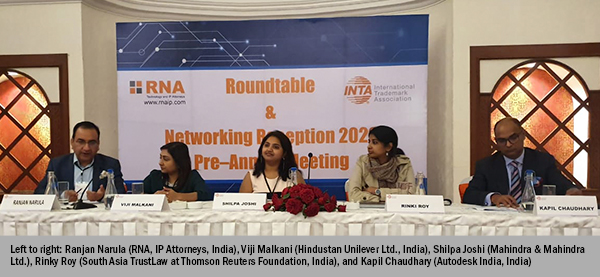‘Brands in a Socially Conscious World’ Roundtable Held in New Delhi
Published: April 1, 2020
Abhilasha Niroola Mehta & Mehta Associates Gurgaon, India
How organizations can develop a corporate social responsibility (CSR) program around the United Nations’ 17 Sustainable Development Goals (SDGs), and the benefits of doing so, was the topic of discussion recently at an event in New Delhi, Delhi, India.
The event, titled “Brands in a Socially Conscious World,” took place on January 31, and was hosted by RNA Technology and IP Attorneys. A panel comprised of brand professionals from India included Viji Malkani (Hindustan Unilever Ltd.), Shilpa Joshi (Mahindra & Mahindra Ltd.), Kapil Chaudhary (Autodesk India), and Rinky Roy (South Asia TrustLaw at Thomson Reuters Foundation). INTA Board Member Ranjan Narula (RNA, IP Attorneys) moderated the panel.

Opening the discussion, Mr. Narula highlighted the increasing interest among consumers to connect and invest in brands that associate with worthy causes. He also discussed the development of the SDGs adopted by the United Nations. The panelists shared how they have integrated the SDGs into their brands and described the diverse projects they’ve launched in conjunction with the SDGs.
For socially responsible companies looking to give back, the panel unanimously agreed that the SDGs provided a framework for CSR projects, made them more efficient, helped businesses stand out from the competition, and enabled them to better connect with consumers.
As an example of why the SDGs are so important, Ms. Malkani noted how a large section of the Indian population still does not have access to basic sanitation. She explained why Unilever believes that sustainable and equitable growth is the only way to create long-term value for its stakeholders, emphasizing that, “Unilever’s purpose is to make sustainable living commonplace, and, therefore, it is at the heart of everything that we do.”
The panel discussed how brands are more likely to connect with partners and vendors that are pursuing projects related to the SDGs, and how the SDGs are incorporated in their own organization’s partner-sourcing policies. They agreed that going forward, this should be a key parameter covering all business partners.
Implementing SDGs is not always easy and has its own challenges, according to the panelists. For example, advertisements containing CSR messaging are not always received as intended and can result in backlash from the public. “Businesses need to think strategically how to enhance brand value through sustainable initiatives,” said Mr. Narula
While consumers today expect brands to undertake CSR initiatives and act responsibly, every individual should be socially conscious. The panelists urged everyone in the room to begin by taking small steps in this direction.
In closing, the panelists suggested that SDGs are not only critical in addressing major global issues but also play a vital role in helping companies develop brand loyalty and more meaningful engagement with consumers.
“CSR and sustainability are not going to be a fad or a trend anymore. It’s going to be a way of life, it’s going to be a way of doing business. So, the sooner we adopt it from the inception, it’s going to be better for the brand owners as well as consumers. That’s what consumers want,” said Ms. Joshi.
The event was originally arranged as an INTA pre-Annual Meeting roundtable, and was held despite the postponement of the Meeting due to the coronavirus outbreak.
© 2020 International Trademark Association
This website uses cookies so that we can provide you with the best user experience possible. Cookie information is stored in your browser and performs functions such as recognising you when you return to our website and helping our team to understand which sections of the website you find most interesting and useful.
To find out more please see our Cookies Policy and Privacy Policy.
These cookies are used to identify a user’s browser as the visitor goes from page to page on the Site. These are session cookies, which means that the cookie is deleted when you leave the Site. It is an integral piece of the Site software and used to let the server know which users are on the Site at any given time and make certain parts of the Site easier to use.
|
|
If you disable this cookie, we will not be able to save your preferences. This means that every time you visit this website you will need to enable or disable cookies again.
These cookies are used to collect information about how visitors use our Site. The cookies collect information in anonymous form, including the numbers of visitors to the Site, where visitors have come to the Site from, the pages they visited and how they have interacted with tools on the Site like search and embedded media players. We use the information to compile statistical reports of our users’ browsing patterns so that we can improve the Site.
|
|
Please enable Functionality Cookies first so that we can save your preferences!
These cookies are used to deliver advertising relevant to the interests of visitors to our Site. They are persistent, which means they will remain on your device after you leave the Site.
- Facebook (Ad Pixel)
- Google (Ad Pixel)
- LinkedIn (Ad Pixel)
- Quattro Anonymous
Please enable Functionality Cookies first so that we can save your preferences!
